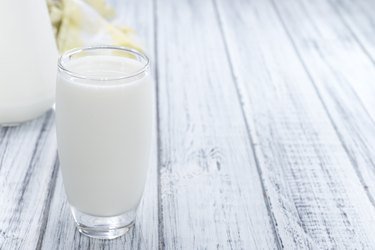
While the average person probably doesn't think too much about urine, doctors do. Its characteristics can be used to detect a number of health problems. For example, urine's color, odor, pH and specific gravity give physicians valuable insight about an individual's physical health. Yet, not all changes in your urine are a cause for alarm.
Normal Urine
Video of the Day
Most urine is clear, ranging in color from light yellow to amber depending on the concentration of solutes. Urochrome is the pigment responsible for giving urine its classic yellow hue. An unexpected change in the color of your urine can be upsetting yet it is not necessarily a cause for concern. For example, while a red or pinkish tinge to urine can indicate the presence of blood and possibly an underlying illness, cloudy or milky white urine can result from something as innocuous as what you had for lunch.
Video of the Day
Milk and Phosphates
Phosphate is an important electrolyte in the body that is derived from the foods you eat. Diet and hydration affect electrolyte concentrations in the blood. Maintaining the proper balance of electrolytes is necessary for good health. Naturally occurring phosphates are a known component of animal's milk as well as many soy varieties. It is possible that ingesting milk coupled with other factors such as hydration can contribute to an increase of phosphates in the blood. This excess phosphate needs to be cleared from the blood via the kidneys and excreted in the urine.
Phosphaturia and Cloudy Urine
White or cloudy urine has a few different causes, including the presence of white blood cells often seen with a urinary tract infection. However, it also can be caused by the presence of mucous, fat or epithelial cells. In some cases, it is the result of phosphaturia, a benign condition that can occur after ingesting milk or other phosphate-containing foods. In phosphaturia, phosphate crystals form in the urine, causing it to temporarily appear milky or cloudy.
Treatment
In the case of diet-induced phosphaturia, no treatment is necessary. Once the excess crystals are excreted, urine's appearance should return to normal. However, because phosphaturia is only one cause of cloudy urine and can be a symptom of a more serious problem, a persistent whitish or milky urine, especially when accompanied by other symptoms such as painful urination and the urge to urinate frequently, should be evaluated by your doctor.